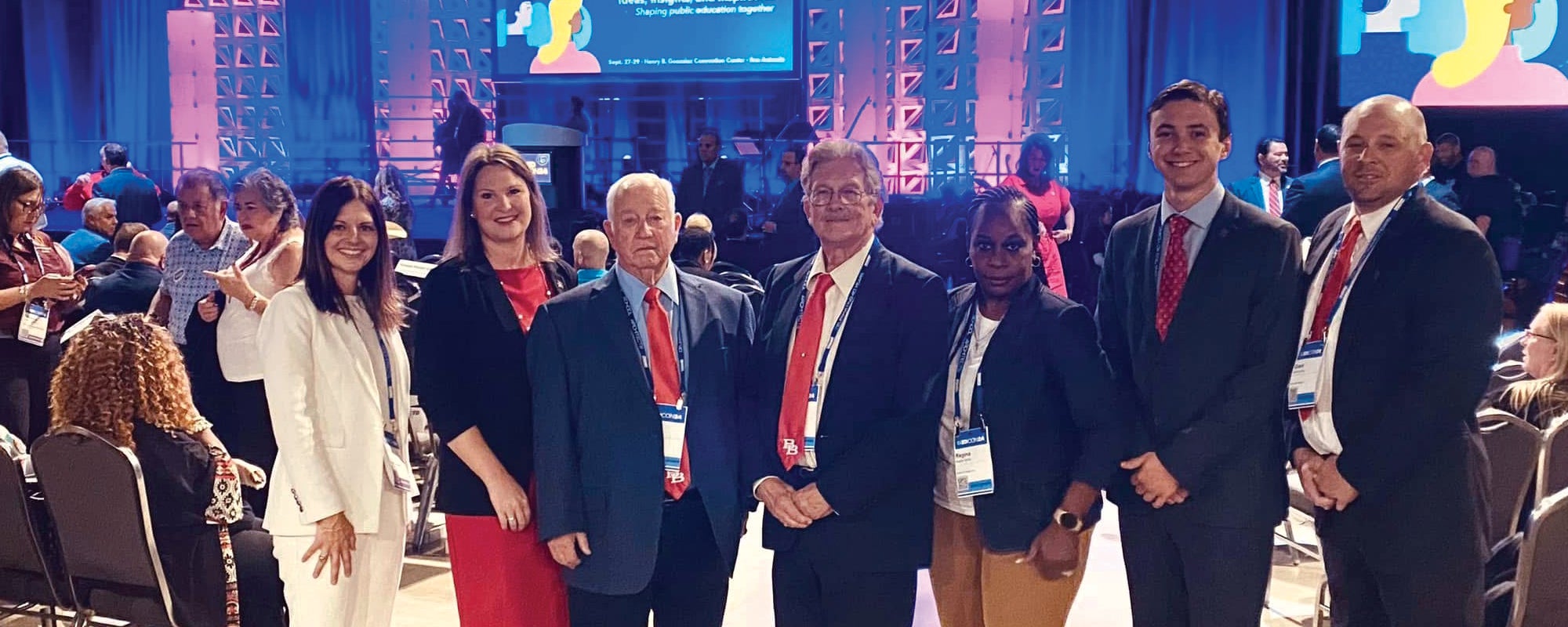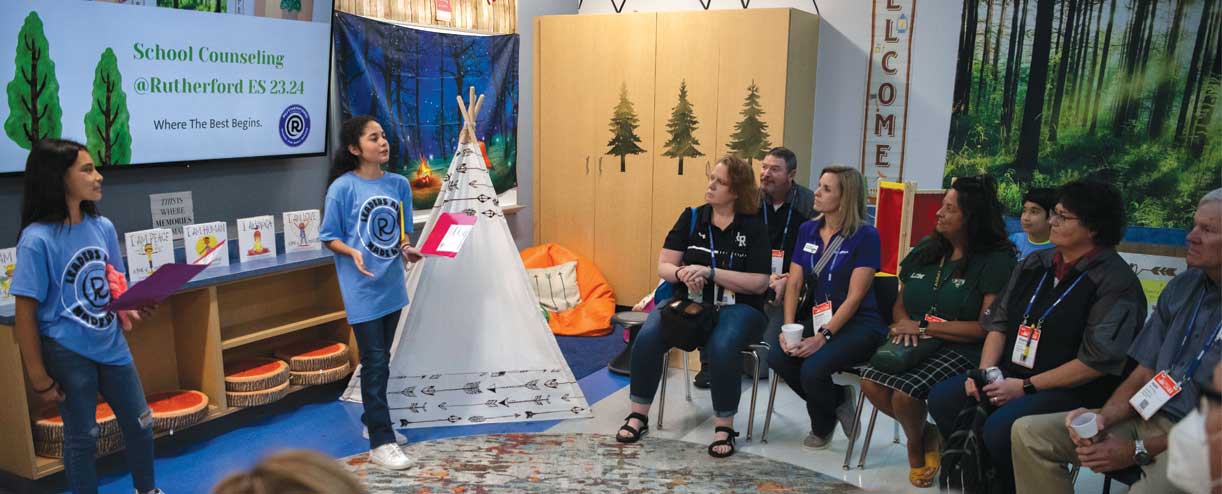Bellville ISD Board's Student Representative Discusses Board Service
Grant Walling’s experience at Bellville ISD was so amazing he wanted to ensure other students would have the same great experience. That’s why, as a junior at Bellville High School, he applied for the student representative position on the Bellville ISD school board. Now a graduate of the district, Walling was selected and served during his senior year in 2024-25.
The addition of the student rep in Bellville ISD, located about an hour west of Houston, came about after the board and the district’s leadership felt something was missing from the board’s process: student perspective and voice. Walling is the third student to have served on the board.
Walling was also active as a student participant on the Bellville ISD advisory committee. He said he plans to study engineering with hopes of becoming a U.S. Navy fighter pilot. He was also involved in other activities, including FFA, and he held a part-time job as a shift manager at a sport facility in Bellville.
Walling shared more about his role and what he learned during his time as a student representative on the Bellville ISD school board.
Q&A
Q: How did you learn about the student representative program at the district?
One of my good friends was one of the representatives the year before. Even before that, I was told by my mom that I should sign up for it. I didn’t because it was my first year at the school. Finally, at the end of junior year, I thought, “I’m good at talking. I think I have great ideas that I can bring forth to the board.”
Q: Why did you want to participate on the board as its student representative?
When I met everyone on the board, I realized they really want what’s better for students in Bellville, and that’s exactly what I want. I want every student in Bellville to have the same [great] experience I’ve had in my four years.
Q: What did you hope to achieve in the role?
A big thing to me was making sure that the people on the board had the right idea about what’s happening [in the schools]. I’m in a high school getting the information, and you know, with my friends all in different sports and different aspects of high school, [I’m] getting that information and being able to relay that information.
Q: What do you do in your role as a student rep on the board?
I’ll go to all the board meetings, all the workshops, just really every meeting possible, I try to go. I voice my opinion.
Q: From a student perspective, how does your role as the student rep benefit the district and students?
I think it makes sure that any policy or rule created doesn’t impact students in a negative way. I’m trying to make sure everything is positive — helping students, not hurting them — so the student perspective gets heard.
Q: How has your view of the district and your education changed since you started participating on the board?
It’s made me appreciate the process of learning. Because when you’re not in this position, you don’t really know. It’s just, “Oh, this teacher just decides to do this.” No, it’s all the way from the federal down to the state, down to the district. And it just amazes me, all the people in that process. Everyone has to work together.
Q: Are there any ideas or projects that you’ve championed as a student rep on the board?
I haven’t really changed anything as much as I’ve given my input on everything. You know a big thing for me is the phone policy. That’s a big worry that’s been voiced professional environment and part of it is professional. And you get to know people more.
Q: Have you learned any skills that you think will help you as you pursue your education and career?
Confidence for sure. I think the biggest thing is preparedness, or preparation, because I have to know what is going on before I speak about it while I’m being recorded on camera. I have to be able to articulate what I’m saying in a way that is understood by others.
Q: What type of time commitment does your service require?
The board meets twice a month: once for agenda review and once for the board meeting. And there’s some months where with work I’ll either go to an agenda review or a board meeting. Sometimes I can’t do both, but that’s just part of juggling. I think over the summer I got a lot more done than during the school year. Because over the school year, it’s more than just budget workshops, budget reports, agenda reviews, and board meetings.
Q: What is the one thing you’ve learned from your time on the board that you think you will always remember?
I will always remember the time, effort, and professionalism put into moving a kid from pre-K, not knowing how to read and write, and getting them all the way through high school and graduating knowing how to do AP calculus. That’s a whole lot for a kid to take in in that time. Whether it’s literal logistics of buses and food or the mental logistics of getting teachers ready to get these students to graduate high school.
Q: What strategies do you employ to balance your academic and extracurricular responsibilities with your duties as a board member?
I’m constantly thinking about things. With juggling this, I think the best thing is to focus on [whatever I’m doing], you know. “Okay, I’m looking at board stuff right now.” Or “I’m doing math homework right now.” Compartmentalizing everything and slowing down. Slow down with what I’m saying and reading. And that is really life in general. I need to make sure I take everything in context and not jump from important thing to important thing.
Q: What challenges have you encountered during your time on the board?
The biggest challenge I think is relaying information effectively and speaking effectively and in a way that’s understood. Especially when I started, I had to get out of my country slang and speak in more professional terms. I think it will help me with jobs, any jobs I get because of the professionalism of it. You can state your opinions, but they have to be [shared] in a professional way.
Q: For school boards and districts that don’t have a program like this but might be considering it, what would you tell them?
I think it’s a great program. I would jump on it because the amount of insight that is brought to the board is unmatched, because clearly no one on the board is a student. You bring all this student perspective and insight that you wouldn’t get otherwise.
Q: What else would you like people to know about your time on the board?
I think it has been one of the most gratifying things that I have ever done. You know, it’s also gotten me to follow my dreams. I’ve always wanted to be a fighter pilot. And for a while there I was like, I can’t be a fighter pilot. I think being on the board, I realized I need to do what I want, otherwise I’ll regret it in 15 or 20 years. It has also shown me I can handle more than I thought I could — board, school, work, horses — it’s shown me that I am more capable than I thought in that regard. I’m working on getting my pilot’s license now. Four years ago, I didn’t think I could handle that and school and work. I didn’t even know I was going to be on the board. So yeah, it’s gratifying. It’s hard work, and I wouldn’t have traded it for anything.
This article was originally published in the June/July 2025 issue of the Texas Lone Star magazine.
Mary Ann Lopez
Mary Ann Lopez is a senior communications specialist for TASB.





